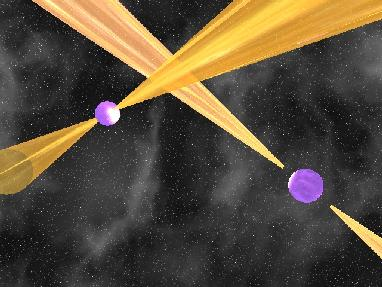Astrophysik: Gravitationswellen
The pulsar as a laboratory

The fact that the pulses sent in our direction by a pulsar are highly regular proves exceedingly useful in the case of binary star systems in which a pulsar orbits another neutron star. The orbital motion influences the arrival time of the pulses - for instance, if its orbit has taken the pulsar a bit further away from Earth, its pulses will take slightly longer to reach us; in addition, there is a relativistic time delay whenever a pulse passes in close proximity to the companion neutron star. All in all, astronomers can obtain from the arrival times both crucial orbital data as well as the masses of the two neutron stars with high accuracy. The important role played by relativistic effects makes such systems ideal cosmic laboratories for testing general relativity - in situations with gravitational fields that are much stronger than those in the solar system.
[ Sitemap ]
[ info ] This website was created by the MPI for the History of Science.
 Scene
Scene


 1st Slide
1st Slide
 Branching Point
Branching Point
 Module: Astrophysik: Gravitationswellen
Module: Astrophysik: Gravitationswellen Sequence: Gravitationswellen Einstieg
Sequence: Gravitationswellen Einstieg Slide: Gravitational Waves
Slide: Gravitational Waves Branching Point: Gravitational waves
Branching Point: Gravitational waves Back
Back

